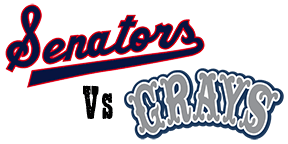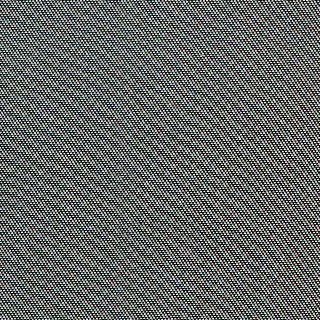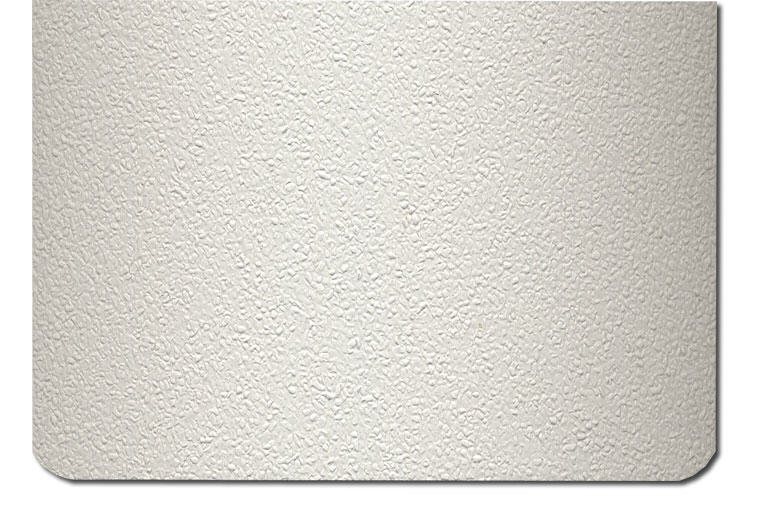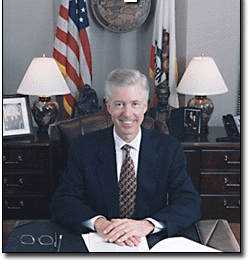November 11, 2004
The Great Debate, Day 4

Denny McLain, Moderator
Thank you, Mr. BallWonk. We will now turn to Mediocre Fred's second statement. A quick reminder to everyone: Be sure to vote early and often (but not more than once a day) in the name poll on the sidebar both here and at BallWonk's blog.
In case you were wondering, that organ music you heard during the intermission was played by yours truly. I have been a virtuoso with the organ since childhood, and in fact I considered becoming a profesisonal organist before I chose baseball. Had I gone that route, I might not have met the "friends" I met while playing baseball, and I might be a free man today. On the other hand, I would not have gotten to know my friend Fat Tony. And I've gotten to know him very well. Very well indeed. But enough about me.
Since the tensions in our contest are beginning to run high, I'd like to remind both of our debaters that express physical threats are prohibited. Also, any weapons can and will be confiscated by the security staff. Bear that in mind as you continue.
Mr. Fred, the floor is yours. Please proceed.
Mediocre Fred, Speaking for the Senators
Thank you, Mr. McLain. Before we proceed, as today is Veteran's Day I'd like to observe a moment of silence in honor of all those who have served our country. Thank you.
Well, I must say I'm not quite sure what to make of my opponent's statements. "All sound and fury, signifying nothing" might be a fair summation. But what really disturbs me is that my opponent is once again showing a laissez-faire attitude toward the facts.
"When I choose a word," Humpty Dumpty once said, "it means just what I choose it to mean -- neither more nor less." That seems to be my opponent's attitude toward the words and numbers he uses. He seems to have a private standard of "truth" and "facthood" in which all his logically precarious arguments somehow hang together. I've been trying for several days now to understand how he justifies his carelessness with the facts, and I've come to the conclusion that the strain of defending an obviously inferior challenger has caused him to revert to a world of fantasy, where black is white, down is up and "Grays" is a more exciting name than "Senators." Yes, my opponent has drifted into Superman's Bizarro World.
I'm sure my opponent is shaking his head. He thinks I'm being too harsh. Am I? I'd like to say so, but I can't find any other explanation that makes sense. Perhaps my opponent can explain some of the more... curious apects of his argument.
For instance, what part of "Washington born and bred" does my opponent fail to understand? He cites some Google-search statistics, as if they were at all meaningful. "Born and bred," our more astute readers will recognize, refers to a place of origin, not the number of hits a name receives in an online search. (I realize this is an elementary fact to many of you, but I'm explaining it slowly so my opponent will understand.) To use an example of my opponent's, he is from Minnesota, but no longer lives there. He is still Minnesota born and bred, no matter how many ears he's lived elsewhere.
As for those other teams that use the Senators moniker currently... they say imitation is the sincerest form of flattery, no? If the name were as boring as my opponent suggests, it would be shunned. But rather, it has been adopted multiple times. Meanwhile, since the Homestead club packed up shop, the "Grays" name has been used by... no one. Must be because it's so exciting, right? But we'll return to that point in a minute.
My opponent rather amusingly discussed the "souls" of ballclubs, and I was so charmed by this I nearly failed to notice that his argument contains the seeds of its own destruction. For if the Dodgers, Giants et al. did not become "defunct" teams when they moved, then how did the Senators become defunct? As my opponent himself said in his opening statement, the original Senators now reside in Minnesota. How can my opponent have it both ways? Either the Senators are no more defunct than the Dodgers etc., or they are just as gone and therefore belong on the list with those other teams. Which is it, sir?
My opponent then goes on to suggest that "no American League team was truly 'big league' in 1901." Really? That's quite interesting, since Major League baseball regards the league as a valid major league in that year, and every year since. It strikes me as odd that my opponent would choose to argue against MLB's interpretation of its own history. But then, perhaps this is to be expected from a man who still does not realize that the Milwaukee Brewers existed as a minor-league team before the major-league squad arrived, despite my having brought it up in my last post. (To be fair, the minor-league Brewers only existed for 50 years, so they were easy to miss.)
My opponent then goes on to attempt to defend "Grays," perhaps the most boring name ever devised by man, as somehow more exciting than "Senators." It's an old debater's trick to go on the offensive on your weakest point, before your opponent has a chance to pound you to smithereens with it. And my opponent is a skilled debater who's learned his lessons well. So it's perhaps no surprise that he chose to mention this point first.
It is something of a surprise, however, that he made such a hash of it. Perhaps you didn't notice, having been dazzled by all his pretty pictures. So let me take you through some of the, ahem, "high points" of his argument. And I do mean "high" in the wacky-weed sense. (I will not stoop to accusing my opponent of being a Natty Boh drinker, as he did in his post. I have too much class to accuse him of drinking swill.)
He contends that "like all truly bad team names, [Senators] has three syllables." The latter part is indisputably true. Senators does indeed have three syllables. Just like Cardinals, Orioles, Indians, and Athletics, all of which are well-liked and historically-grounded names. Perhaps my opponent is afraid of multisyllabic words, but there's no good historical reason for the rest of us to be.
Then he proceeds to show us a bunch of pictures of wrinkly white men in conservative suits and uses this to conclude that Senators is less interesting than Grays.
Well, I've assembled a little photo gallery of my own, to show you how exciting gray really is. Ready? Here we go!

Ooooohhh... ahhhh....

Boy, isn't this exciting?

Wait, it gets better...

No, it doesn't.

Bored yet?

How about now?

Zzzzzzz....
And not every Senator is as dull as my opponent's little slide show would suggest. Ladies and gentlemen, I offer you... Mary Landrieu!

Definitely not boring!
I'd like to see the Gray that can match her for excitement.
Oh, by the way, while there are many famous, illustrious and exciting Senators, the only famous Gray I can think of is.... Gray Davis.

Hi, remember me?
If there is a more boring person in politics today, I have not met this person. And since my opponent made such a big deal about the electoral defeats of Senators, I would like to point out that the last time that the above-mentioned Gray was involved in an election, he was the first governor to be recalled from office in over 80 years. Senators may lose, but Grays lose historically.
I've really just scratched the surface of my opponent's deceptions and contradictions, but as with the last post, discussing them all in detail would take too long. So let me address one of the most popular arguments in favor of the Grays: acknowledging the Negro Leagues.
My opponent can spin it any way he likes, but he knows as well as I do that were it not for the existence of the Homestead teams, no one would give even a moment's consideration to a snoozer of a name like Grays. People like my opponent support Grays because they believe that the league and the sport don't do enough to honor the Negro Leagues' heritage. And they have a point. MLB doesn't do enough to honor the Negro Leagues. And people like my opponent, men and women of conscience that they are, think that naming our team after the Grays will rectify this historical oversight.
I applaud the sentiment but not the execution. A team name is just a token. White people with guilty consciences approve tokens like these because they can feel better without exerting much effort. Future generations may well believe that Martin Luther King's primary accomplishment was getting us a day off work in January.
Do you think DC's sizable African American community is going to be grateful to the powers that be for this show of tokenism? Let's look at some history. Specifically, let's look at my opponent's beloved example, the Kansas City Royals. The team was named to honor the legendary Monarchs, as my opponent pointed out in his opening statement. Now, if you believe the argument of Grays supporters, black fans would be flocking to the Royals, right? Well, according to this article, it ain't so, Joe:
More than 50 million fans have attended Royals games inside Kauffman Stadium since the Truman Sports Complex opened in 1973. Last season almost 1.8 million pushed through the turnstiles at the K. Some of these fans were baseball junkies, some merely curious tourists. One trait that nearly all these fans shared was that they were white.Mike Levy, the Royals' vice president of marketing, acknowledges the franchise's problem in attracting African-American fans. "The statistics are real," says Levy. "We know from our focus groups that there are a lot of African-American fans watching the Royals on television and listening on the radio every night. It's difficult to understand why they don't come out to the stadium."
Buck O'Neil, the Negro Baseball League legend, thinks he knows why Kansas City's black residents have turned away from the Royals, and the problem dates back to the Athletics' arrival on the turf of the Monarchs, the city's Negro League team. "The A's came to Kansas City [in 1955] and didn't sell baseball to the black baseball fans," recalls O'Neil. "They sold it to Johnson County. They sold it to the white fans. They had a built-in fanbase with the Monarchs' fans, but they didn't think they needed them."
There is an underlying animosity in the black community toward the Royals that the organization seems unaware of. Glen Graham's father pitched for the Belmont Baby Blue Birds in the Negro Leagues. Graham hawked programs inside the old Municipal Stadium at 22nd and Brooklyn, right in Kansas City's most historic black neighborhood. He believes the Royals stole baseball. "They built [Kauffman] Stadium and designed it for people other than us," Graham says while attending the Cardinals series. "The basic black family can't afford to pay $15 for a seat like I did here tonight."...
Dell Wells owns D's Barber Shop on 34th and Prospect. "We have that conversation here at the shop all the time," says Wells, when asked why more blacks don't go to the K. "I used to be an avid fan of the Royals, but I don't follow them much anymore. There just aren't a lot of black players on the team, and the Royals don't want to spend the money to sign any quality black players."...
"The Royals need to do more than give away 30,000 Monarch caps once a year," says [Negro Leagues Museum director Don] Motley, referring to Monarch Cap Night, which takes place Saturday, June 23. "It's embarrassing that Kansas City is the home of the Negro Leagues Baseball Museum and they don't do more to attract black fans."
A team name is an empty gesture. If we want to be serious about attracting African American fans to the sport (and we should), let's do something meaningful. Let's market aggressively east of the river. Let's make sure there are affordable tickets in the new park, so that the residents of the surrounding neighborhoods can afford to go to the games. Let's put a Negro Leagues museum inside the new park, so that fans of all races can learn more about an oft-neglected chapter of baseball's history. Let's sign more African-American players. Let's hire more minorities on the coaching staff and in the front office. Let's do outreach, working with programs like Reviving Baseball in the Inner Cities to spread the sport in the African American community. In short, let's be a model franchise for minority participation in the sport.
If we want to be serious about bringing the game back in the African American community, we need to take serious measures. This house is rotten at the foundation, and my opponent wants to apply a fresh coat of paint. We can do better. We should do better. And the Senators will do better.
Posted by Fred at November 11, 2004 01:07 AM